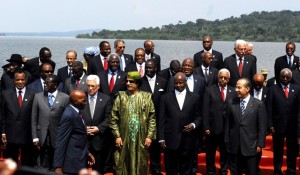Kò si oye ọdún ti ọ̀pọ̀lọpọ̀ Òṣèlú Ilẹ̀ Aláwọ̀-dúdú lè lò ni ipò ti wọn lè gbà lẹ́rọ̀ lati kúrò. Bi àyè bá gbà wọn, wọn fẹ kú si ori oyè. Bi a bá ṣe akiyesi ọ̀pọ̀lọpọ̀ Òṣèlú Òkè-Òkun, bi àwọn ará ilú bá ti dibò pé wọn kò fẹ́ wọn nipa yin yan ẹlòmíràn, wọn yio gbà lẹ́rọ̀, lati gbé Ìjọba fún ẹni tuntun ti ará ilú yan, ṣùgbọ́n kò ri bẹ ẹ ni Ilẹ̀ Aláwọ̀-dúdú.
Ohun ti ó jẹ́ ki àwọn Òṣèlú Ilẹ̀ Aláwọ̀-dúdú fẹ́ kú si ipò pọ. Ọ̀pọ̀lọpọ̀ Olóri Òṣèlú Nigeria, ki ba jẹ ti Ìjọba Ológun tàbi Alágbádá, kò si ẹni tó mọ bàbá wọn ni ilú, ṣùgbọ́n wọn kò kọ́ ọgbọ́n pé ọ̀pọ̀ ọmọ ti wọn mọ bàbá wọn ni àwùjọ kò dé ipó nla ti àwọn dé. Ó ṣe é ṣe ki ó jẹ́ wipé ìbẹ̀rù iṣẹ́ ti ó ṣẹ́ wọn ni kékeré ló jẹ́ ki wọn ni ojúkòkòrò lati fi ipò wọn ji owó ilú pamọ́ fún ara wọn, ọmọ àti aya wọn nitori ìbẹ̀rù iṣẹ́. Kò si oye owó ti wọn ji pamọ́ ti ó lè tẹ́ wọn lọ́rùn, eyi ló fa ìbẹ̀rù à ti kúrò ni ipò agbára. Ìbẹ̀rù ki ẹni ti ó bá má a gba ipò lọ́wọ́ wọn, ma ṣe ṣe iwadi wọn na a pẹ̀lú, nitori wọn ò mọ̀ bóyá yio bá wọn ṣe ẹjọ́ lati gba owó ilú ti wọn ji kó padà.
Kàkà ki ilú gbérí, ṣe ni ọlá ilú nrẹ̀hìn. Bi Òsèlú bá ji owó, wọn a ko ọ̀pọ̀ owó bẹ́ ẹ̀ lọ si Òkè-Òkun tàbi ki wọn ri irú owó bẹ́ ẹ̀ mọ́lẹ̀ lóri ki kọ ilé ọ̀kẹ́ aimoye ti ẹni kan kò gbé. Ọ̀pọ̀ owó epo-rọ̀bì ló wọlé, ṣùgbọ́n àwọn Òṣèlú àti àwọn olè bi ti wọn njẹ ìgbádùn nigbati ará ilú njìyà. Lára ìpalára ti ji ja ilú ni olè fa, ni owó Nigeria (Naira) ti ó di yẹpẹrẹ, àwọn ọdọ kò ri iṣẹ́ ṣe, àwọn ohun amáyé-dẹrùn ti bàjẹ́ tán, oúnjẹ wọn gógó àti bẹ́ ẹ̀ bẹ́ ẹ̀ lọ.
Òwe Yorùbá ti ó ni “Ohun gbogbo ki i tó olè” fi àlébù ojúkòkòrò, ifẹ́ owó, àti à ṣi lò agbára han ni ilú, pàtàki ni Nigeria.
ENGLISH TRANSLATION
There is no amount of years spent by African leaders or Politicians that would make them agree to step down easily. If given the chance, they would rather die than give up their position. Observing the Politicians in the Western world, if they are rejected at the poll by electing another leaders, they easily agree to hand over to the newly elected, but this is not the case in Africa.
There are many reasons why the African leaders would rather die than give up their position. Many of the Nigerian leaders, either Military of Civilian leaders have no class or pedigree, and they have not learned that many children from wealthy fathers or from privileged backgrounds never make it to the top. It is possible that the poverty they experienced while growing up might have been the driving force behind the greed to use their position to steal public funds in storage for themselves, their children and wives. No amount of wealth amassed, would ever satisfy them, hence the fear of giving up position of power. Perhaps they fear that a newly elected leader might probe them in order to recover stolen public funds.
Instead of prosperity the people are impoverished. When Politicians steal, such public loot is siphoned abroad or used to build many houses that are often empty. There is huge revenue from Crude Oil, but only the Leaders/Politicians and their cronies are enjoying while the people are left to suffer. Some of the consequences of stealing public funds are evident in the devaluation of the Nigerian Currency (Naira), Youth unemployment, infrastructural decay, very expensive cost of food, inflation, etc.
The Yoruba proverb that says “Nothing ever satisfies the thief”, depicts the ills of greed, love of money and misuse of power in a very glaring manner in Nigeria.
Originally posted 2015-02-20 09:15:08. Republished by Blog Post Promoter



